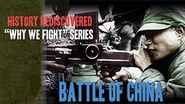dimplet
This is not a propaganda film; it is an un-propaganda film, as in the "un-cola." If you want to see what propaganda looks like, just turn on Fox "News." "Why We Fight" is pretty straightforward about it's purpose: It is an explanation of how America and its allies got into World War II, and why we need to win it. But the Battle of China is more than that; it is a history of China, a portrait of its people, a description of its geography, as well as a detailed account of the actions of Japan, China and the Allies in the war, up to that point.It is mostly a statement of facts,aside from the occasional remark about the war as being one of civilization vs. barbarism, or something like that, which is a fairly objective assessment of Imperial Japan and Nazi Germany, and the behavior of their soldiers. As with his populist movies, Capra builds up feeling through his presentation of people and events, rather than hitting you over the head with moralizing.Most of all, the movie is factual and accurate, as far as it can be, given that the war was in progress, and we did not have access to information historians now have. We would now say that the film is too kind to Chiang Kai-Shek, who Gen. Stilwell and President Truman had little respect for; but what do you expect in the midst of the war? On the other hand, it is quite sympathetic to the guerrilla fighters, who I assume were affiliated with Mao.I daresay that most viewers would learn quite a bit about history by watching this, whether they are Americans or Chinese. I don't think the Chinese are aware of the support they received from America, who was their ally even before Pearl Harbor. Our support for China in the 1930s may have played a role in prodding Japan to attack us at Pearl Harbor.The film is also interesting because of the historical footage showing China, its people, cities and farmers, before the war. You look at it and get a sense of its diversity of people, and that it was making a deliberate, well thought out effort toward modernization early in the 20th century. If the war and Maoist Communism hadn't intervened, China would have modernized, perhaps earlier. And in the portrait of China of earlier times, you get a sense of the character still alive in China today, of a reasonable, hard-working, progressive people.To fully appreciate the style of this film, one must be familiar with Frank Capra's feature films, such as Meet John Doe, Mr. Smith Goes to Washington and It's a Wonderful Life. Capra has always had a great love of the little people, the average Joe, and you see that respect in his portrayal of the Chinese people. He also has great admiration for American values, and you get the sense of the compatibility of Chinese values, not, perhaps coincidentally, because of the purpose of this film. But you see that respect for China also in a film he made 12 years before, The Bitter Tea of General Yen, so I believe it is sincere.Why We Fight was made to be shown to the American and allied military, as well as in movie theaters back home, and in Britain.It was the idea of the great but modest General George Marshall. If I were a soldier watching this during World War II, I would come away knowing a lot more about China. I would also understand the strategy and battles to that point, and be in a better position to grasp any future orders.The remarkable thing about World War II is how much it resists efforts to encapsulate it in one hour packages or series. There is always more to the story. In China's case, there was the role its people played in helping the downed fliers of Jimmy Doolittle's raid over Tokyo in 1942, who had to land or crash their planes in China because it was impossible to return to their aircraft carriers.This film is still relevant today because of the limited and somewhat distorted view China and the U.S. have of each other and the history of their relationship.
jeffchan
Part 6 in a series of 7 films created as a briefing for soldiers but also released for public viewing, these films by Frank Capra for the War Department are simultaneously good propaganda and good history, well told. Footage is from the field, and the historical facts behind the narration are largely accurate and informative, if "embellished". The embellishment is what makes it propaganda, yet it does not diminish the facts presented. I'm very impressed that an informed and largely accurate reading of history could be presented in a way that makes an emotional and moral point about the justness of fighting fascism, deliberate mass murder of civilians and tyranny. (And no, that fight does not justify later bombings of Dresden or Hiroshima and Nagasaki.)Effective and well done, this is influential film-making during a time of chaos, confusion and disarray. In hindsight we can see that things turned out well for our side, yet at the time these films were made victory against world fascism was definitely not a certainty. These films helped to lay a moral foundation for the open-ended challenges faced then. They also provided a historical context and education about world events leading up to American involvement in the war that most soldiers probably did not possess. Pearl Harbor was correctly presented as a midpoint in Japan's war of aggression, not the beginning of it. This film was a "morning wake up" historical briefing for the sleeping giant's fighters.

